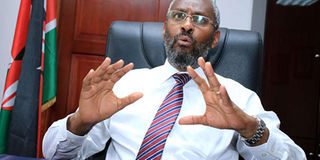Varsities face salaries crisis amid Covid-19

University of Nairobi Vice-Chancellor Stephen Kiama says they are trying to come up with sustainable measures to boost their finances as learning institutions remain shut over coronavirus. PHOTO | FILE | NATION MEDIA GROUP
What you need to know:
- Technical University of Kenya Vice-Chancellor Francis Aduol said the pandemic would hit universities hard.
- Also likely to be affected is the reporting date for first years meant to join universities, which begin their academic calendars in May.
Universities are staring at a salary crisis as the learning lockdown continues due to the coronavirus pandemic sweeping the globe.
The universities, which were on March 15 ordered to close down to prevent the spread of the virus, largely depend on tuition fees to pay salaries because the government only funds them partially.
According to Prof Mumo Kisau, the chairman of the Kenya Association of Private Universities, the institutions will not be able to pay salaries for all staffers if the lockdown continues beyond March.
“Already, learning programmes have been disrupted severely, although we are trying to ease the damage through online courses, but how are we going to pay the lecturers?” he posed on the telephone.
He said most students pay their fees towards the end of a semester, just before the examinations, adding that a majority, especially in private universities, had paid less than half before the closure.
MITIGATION STEPS
According to official budget figures, the government allocates Sh42 billion for students in both public and private universities.
Out of this, Sh2.5 billion is given to the 40,000 students in private institutions while Sh39 billion goes to the 279,000 students in public institutions.
Ideally, the government should pay 80 per cent for each student under the Maximum Differentiated Unit Cost, while the remaining 20 per cent should be shared between parents and universities.
However, the government only caters for about 61 per cent of the total cost of a degree programme in public universities while those in private ones are funded at about 32 per cent.
University of Nairobi Vice-Chancellor Stephen Kiama said meeting payroll costs will be a huge challenge because they depend largely on the Module II programmes which have also been stopped.
“We are scrambling to put up intervention measures not only to stay afloat but also to keep our programmes going. We depend mostly on the privately-funded students to keep the university running, but that revenue stream is obviously no longer working,” Prof Kiama said.
CBA IN LIMBO?
The university is currently training its lecturers on how they can perfect online training so students can be asked to pay fees, he said.
In a memo to lecturers on Wednesday, Prof Madara Ogot, the university’s Acting Deputy Vice-Chancellor for Finance, Planning and Development, sought to assure the academic staff that the university was working to ensure they are paid by April 1.
Technical University of Kenya Vice-Chancellor Francis Aduol said the pandemic would hit universities hard.
“I really don’t want to discuss this further because I think it is too early to take stock of the damage," said Prof Aduol.
Also likely to be affected is the reporting date for first years meant to join universities, which begin their academic calendars in May.
The learning lockdown was put in place as more than 9,000 lecturers and workers in public universities were looking forward to the implementation of the 2017-2021 collective bargaining agreement, which awarded them Sh8.8 billion.




